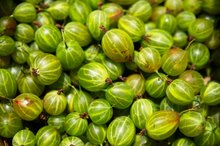The Best Dosage of Passionflower for Treating Anxiety
In herbal medicine, passionflower refers to Passiflora incarnate, one of several hundred species of flowering plants and vines that make up the Passiflora genus 1. Native to the southeastern portions of North and South Americas, passionflower is a traditional herbal remedy for anxiety and anxiety-related disorders, such as insomnia and generalized anxiety disorder, or GAD 1. Dosage depends on the form of the herb used and is generally considered safe for adults. However, consult a qualified health care practitioner before using passionflower to self-treat your anxiety, especially if you take other medications 1.
If you are experiencing serious medical symptoms, seek emergency treatment immediately.
Pharmacological Actions
Passionflower is used to address anxiety and other problems related to nervousness, including sleep disturbances, stomach upset, irregular heartbeat and excitability 1. Prior to 1978, passionflower was approved as an over-the-counter natural sedative in the U.S., but this designation was later revoked because of insufficient evidence to establish effectiveness and safety 1. The Natural Medicines Comprehensive Database rates this herb as “possibly effective” in the treatment of anxiety and as part of a combination botanical product formulated to address a psychiatric disorder called “adjustment disorder with anxious mood." Although the exact mechanism behind the anti-anxiety effect is not clear, scientists suspect that compounds in the plant stimulate an increase in the production of gamma-aminobutyric acid, or GABA, in the brain, which produces a mild sedative effect.
Available Forms
When Is the Best Time of Day to Take Siberian Ginseng?
Learn More
Passionflower is available in capsule and tablet form, as a liquid extract and tincture, and as homeopathic preparations 1. An infusion or tea is prepared by steeping 1 tsp. dried herb in a cup of boiling water for 10 minutes and then straining. The herb is also added to bath water or prepared as an infusion and used as a wash.
- Passionflower is available in capsule and tablet form, as a liquid extract and tincture, and as homeopathic preparations 1.
- The herb is also added to bath water or prepared as an infusion and used as a wash.
Recommended Oral Dosages
The University of Maryland Medical Center provides the recommended adult doses for passionflower as 10 to 30 drops of the fluid extract, taken three times per day, and 10 to 60 drops of tincture, three times a day 12. For insomnia, a cup of tea made from the herb is recommended one hour before retiring, although 3 to 4 cups of tea may be taken to counter anxiety throughout the day. MedlinePlus , the National Institutes of Health's medical information website, recommends a tablet containing 90 mg of drug daily, or 45 drops of liquid extract per day for the specific treatment of GAD 1.
Homeopathic Preparations
Is There a Difference Between Valerian Root Tea and Capsules?
Learn More
**According to the Physicians’ Desk Reference for Herbal Medicines, acute anxiety may be treated with 10 homeopathic globules every 30 to 60 minutes, or one to three times per day for chronic anxiety 3.
Pediatric Use
Although passionflower is generally considered safe in therapeutic dosages, the administration of this herb to children has not been studied 1. For this reason, UMMC does not recommend giving passionflower preparations to children unless under the supervision of a medical professional 12. Similarly, this herb should not be taken during pregnancy or lactation.
Potential Side Effects
Since passionflower exerts sedative properties, it may heighten the effects of anti-seizure medications, tricyclic antidepressants, barbiturates and benzodiazepines 1. This herb may also increase the risk of bleeding if combined with blood-thinning medications, including aspirin.
Related Articles
References
- University of Maryland Medical Center: Passionflower
- “Physicians’ Desk Reference for Herbal Medicines”; Thomas Brendler, et al.; 2007
- Liu L, Liu C, Wang Y, Wang P, Li Y, Li B. Herbal Medicine for Anxiety, Depression and Insomnia. Curr Neuropharmacol. 2015;13(4):481-493. doi:10.2174/1570159X1304150831122734
- Miroddi M, Calapai G, Navarra M, Minciullo PL, Gangemi S. Passiflora incarnata L.: Ethnopharmacology, clinical application, safety and evaluation of clinical trials. J Ethnopharmacol. 2013;150(3):791-804. doi:10.1016/j.jep.2013.09.047
- National Center for Complementary and Integrative Health. Passionflower. Updated September 2016.
- Akhondzadeh S, Kashani L, Mobaseri M, Hosseini SH, Nikzad S, Khani M. Passionflower in the treatment of opiates withdrawal: A double-blind randomized controlled trial. J Clin Pharm Ther. 2001;26(5):369-373. doi:10.1046/j.1365-2710.2001.00366.x
- Movafegh A, Alizadeh R, Hajimohamadi F, Esfehani F, Nejatfar M. Preoperative Oral Passiflora Incarnata Reduces Anxiety in Ambulatory Surgery Patients: A Double-Blind, Placebo-Controlled Study. Anesth Analg. 2008;106(6):1728-1732. doi:10.1213/ane.0b013e318172c3f9
- Miyasaka LS, Atallah ÁN, Soares B. Passiflora for anxiety disorder. Cochrane Database Syst Rev. 2007;(1):CD004518. doi:10.1002/14651858.CD004518.pub2
- Ebrahimie M, Bahmani M, Shirzad H, Rafieian-Kopaei M, Saki K. A Review Study on the Effect of Iranian Herbal Medicines on Opioid Withdrawal Syndrome. J Evid Based Complementary Altern Med. 2015;20(4):302-309. doi:10.1177/2156587215577896
- Parashar B, Bhatoa PK, Bhatoa A, Yadav V. Anxiety: A Common Problem with Human Beings. The Pharma Innovation. 2012;1(5):10.
Writer Bio
Karyn Maier is a seasoned columnist and feature writer. Since 1992, her work has appeared in Mother Earth News, The Herb Quarterly, Better Nutrition and in many other print and digital publications. She is also the author of five books, and is published in six languages.









